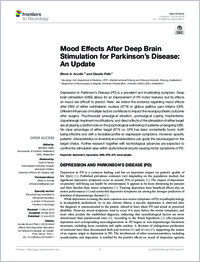Mood effects after deep brain stimulation for Parkinson’s disease: an update
- Accolla, Ettore A. HFR - Hôpital Cantonal Fribourg - Unité de Neurologie Service de Médecine et Département de Médecine, Neurologie, Université de Fribourg, Switzerland
- Pollo, Claudio Department of Neurosurgery, Inselspital, University Hospital Bern, University of Bern, Bern, Switzerland
- 14.06.2019
Published in:
- Frontiers in Neurology. - 2019, vol. 10, p. 617
English
Depression in Parkinson's Disease (PD) is a prevalent and invalidating symptom. Deep brain stimulation (DBS) allows for an improvement of PD motor features, but its effects on mood are difficult to predict. Here, we review the evidence regarding mood effects after DBS of either subthalamic nucleus (STN) or globus pallidus pars interna (GPi). Different influences of multiple factors contribute to impact the neuropsychiatric outcome after surgery. Psychosocial presurgical situation, postsurgical coping mechanisms, dopaminergic treatment modifications, and direct effects of the stimulation of either target are all playing a distinct role on the psychological well- being of patients undergoing DBS. No clear advantage of either target (STN vs. GPi) has been consistently found, both being effective and with a favorable profile on depression symptoms. However, specific patients' characteristics or anatomical considerations can guide the neurosurgeon in the target choice. Further research together with technological advances are expected to confine the stimulation area within dysfunctional circuits causing motor symptoms of PD.
- Faculty
- Faculté des sciences et de médecine
- Department
- Médecine 3ème année
- Language
-
- English
- Classification
- Biological sciences
- License
-
License undefined
- Identifiers
-
- RERO DOC 327089
- DOI 10.3389/fneur.2019.00617
- Persistent URL
- https://folia.unifr.ch/unifr/documents/308198
Statistics
Document views: 133
File downloads:
- pdf: 194
